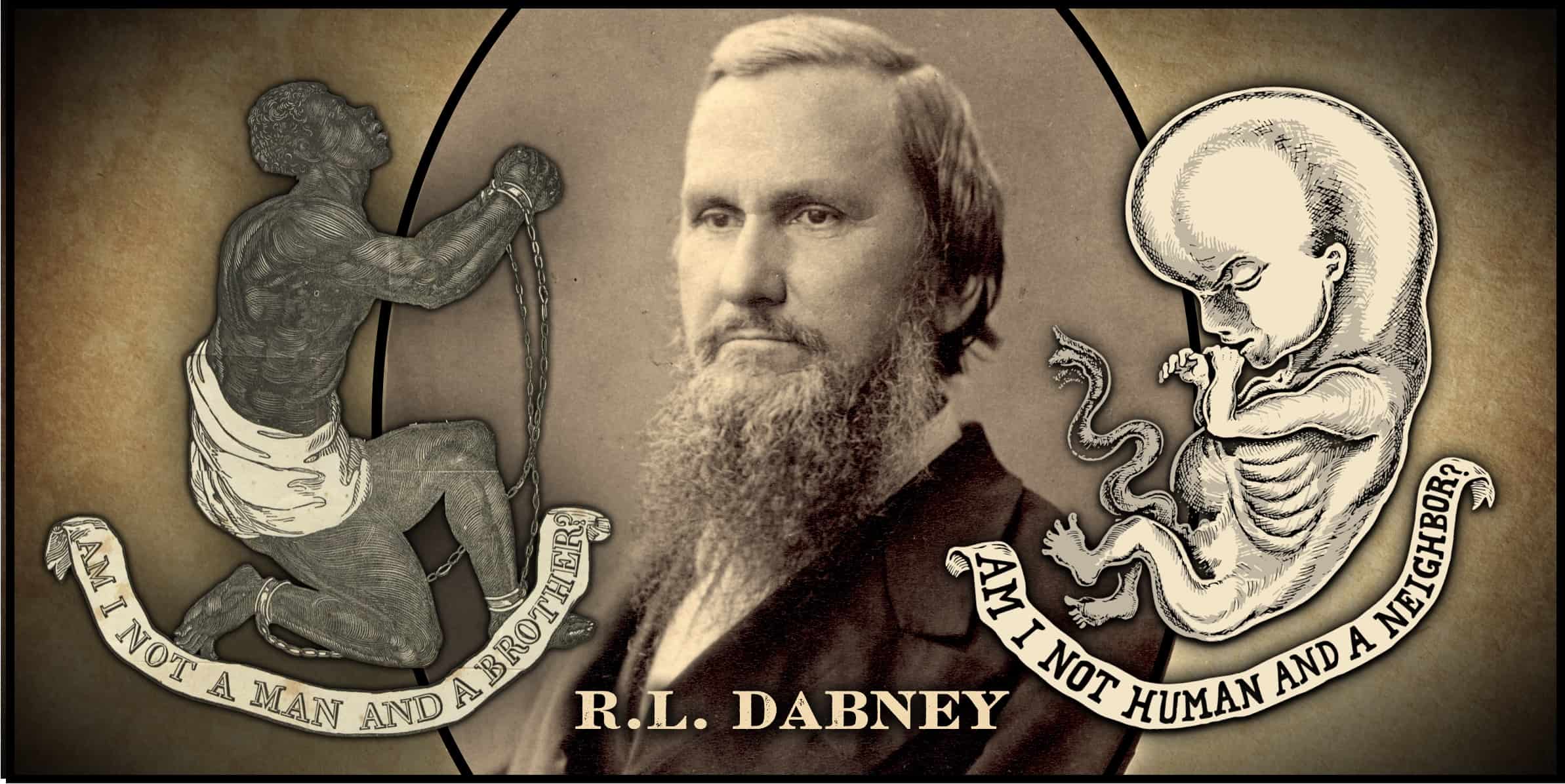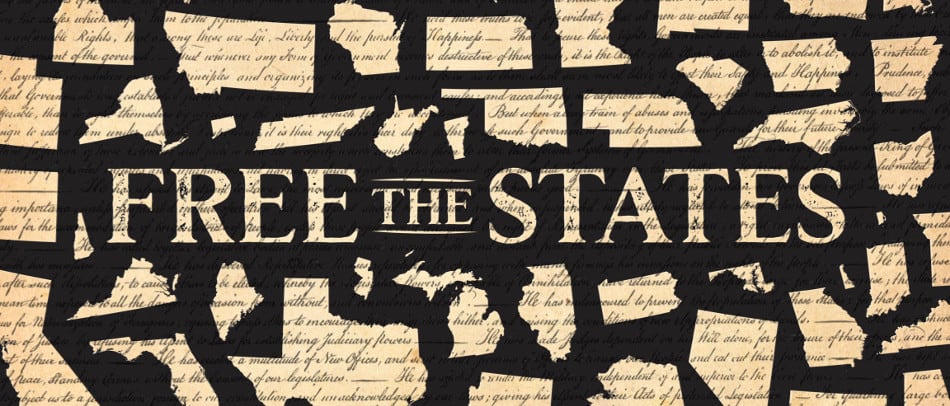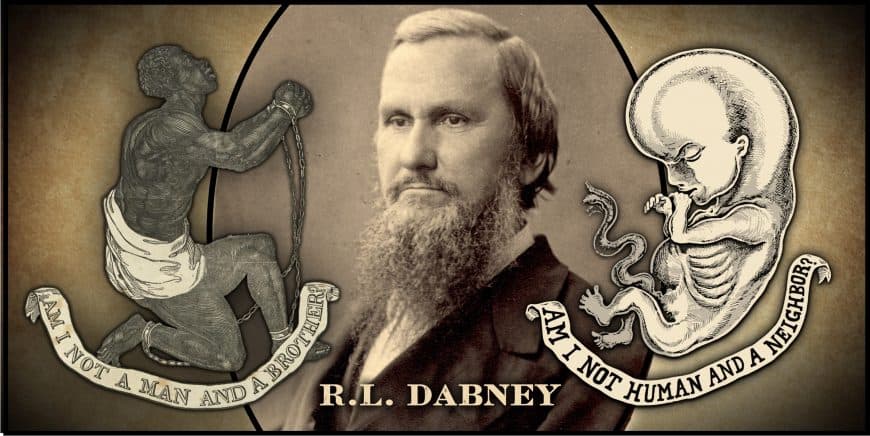
Theologian and Confederate apologist Robert L. Dabney was among the most influential southern Presbyterians of the Civil War era. Dabney authored a number of books held in high regard by some today including The Five Points of Calvinism, A Defence of Virginia, and his Systematic Theology.
There is much to appreciate about Dabney, who was a skilled writer and insightful theologian on many subjects. But his views toward black people were rebellion against God and sin against Dabney’s black contemporaries. This is no small matter.
Dabney: Wrong on Slavery
Dabney intertwined his views of providence with racism to defend the institution of slavery. The slaves, he argued, were greatly blessed by God bringing them into submission to what Dabney believed was a morally superior race. In A Defence of Virginia, he wrote: “[W]as it nothing, that this race, morally inferior, should be brought into close relations to a nobler race, so that the propensity to imitation should be stimulated by constant and intimate observation, by domestic affection, by the powerful sentiment of allegiance and dependence?” [p. 282].
Elsewhere in the book, he rejected the abolitionists’ accusations that slavery enabled rape and other forms of sexual immorality by arguing that interracial relations were unlikely because “the very sentiment of the superior caste would render the intercourse more repulsive and unnatural” [p. 282].
He perpetrated delusions such as the idea that slaves in the South were compensated better than any laborers on earth: “But our enemies return to the charge, urging that we robbed our slaves, because we engrossed to ourselves the lion’s share of the bondsman’s labour… The slave’s share was not a pittance, but much more like the lion’s share… Southern slaves enjoyed a larger share of the proceeds of conjoined capital, superintending skill, and labour, than any operatives in the world” [p. 276]. The book is littered with dozens more examples equally as bad as these.
Notably, reformed pastors Doug Wilson and John MacArthur have both spoken highly of Dabney, with the latter not mentioning Dabney’s unabashed white supremacy-supporting publications and the former sometimes relying on them for his own writings. Wilson frequently cites A Defence of Virginia in his book on slavery, Black and Tan. Wilson also wrote that Dabney’s book persuaded him to change his perspective on the Civil War: “I also read Dabney’s A Defense of Virginia and the South in mid-1984, and was persuaded that my previous take on the Civil War had been too facile.”
In an 1867 address, Dabney told a gathering of Southern Presbyterians, “[A]n insuperable difference of race, made by God and not by man, and of character and social condition, makes it plainly impossible for a black man to teach and rule white Christians to edification.” Later in the speech, he argued that black people were likely forever deficient, and that no amount of sanctification could bring them to the level of the white man: “I greatly doubt whether a single Presbyterian negro will ever be found to come fully up to that high standard of learning, manners, sanctity, prudence, and moral weight and acceptability which our constitution requires.”
Wilson (rightly) objects to critical race theory, whose more extreme advocates will argue that “whiteness” is inherently evil. The implications of this assertion include the gospel not being sufficient to sanctify white people. Dabney is teaching the same heresy of skin color making one’s character beyond the hope of the Spirit working in us to sanctify our sin and make us more like Christ.
Dabney’s white supremacy infected even his systematic theology, in which he wrote, “Thus, if the low grade of intelligence, virtue, and civilization of the African in America, disqualified him for being his own guardian, and if his own true welfare, and that of the community, would be plainly marred by this freedom; then the law decided correctly that the African here has no natural right to his self-control, as to his own labour and locomotion.”
It is clear that Dabney lacks the moral credibility to accurately relay to us from history the atrocities of American chattel slavery because of his prejudice against his neighbors and brothers according to the promise. He thought that race-based chattel slavery was a moral good and defended it as such. However, he wasn’t wrong on everything.
Dabney: Right on Abolitionism
Even with all of his inconsistencies and sins regarding his poor, mistreated neighbors, Dabney saw the Biblical truthfulness of abolitionism. Indeed, Dabney thought that to be anything less than the most ardent abolitionist was defiance of Scripture! That is, if chattel slavery was wrong. Today there is no debate among serious Christians that abortion is murder, yet many reject abolitionism and abolitionists, and sometimes that rejection is because of men like Dabney.
Dabney wrote in a newspaper article defending slavery [emphasis added]:
“If I did not believe that the bible taught [that slavery was morally innocent], I must, in consistency, be a thorough abolitionist. I cannot see how men can say in one breath, that slavery is a malum per se and in the next, that a conscientious man may lawfully continue it for the present, because of the difficulties of emancipation. My conscience and my bible teach me that, if an act is wrong, in its own essential nature, sin, I am to cease it at once. I have no right to look at the supposed evil consequences or difficulties of the reformation. God has not told us that we are to love his law when convenience and safety permit; he has told us that if we do not love it in preference to convenience, profit, and life itself, we cannot be his disciples. Consequences belong to God, duty belongs to us. What would be the thought of the man, who should plead that he ought not to cease living in an adulterous connexion, because a change would be dangerous and inconvenient?—Would not you answer, “unless you cease that connexion at every risk, you are an immoral man?” So, in answer to all the pictures of the mischiefs which emancipation would bring on master and slave, if I believed that slavery were, in its own abstract nature, malum per se, I should be compelled to answer in the words of the well known maxim: Fiat justitia, ruat cælum!”
Dabney was an ardent defender of race-based chattel slavery, but here, expertly makes the case for abolitionism; that is, the doctrine that we must work for the immediate eradication of that which is sin. He makes three arguments against smash mouth incrementalism.
1) Immediatism is Biblical
It is not simply a matter of political strategy. It is a matter of what Scripture does and does not say regarding the eradication of evils. According to Dabney, it is a matter of Biblical fidelity to eradicate evils immediately.
The Bible endorses no scheme of partial repentance. It demands their total and immediate obedience to their creator which is made possible only through the grace of God in the bloody cross. Just as Jesus came to abolish death through His death, we who are bought by the blood of Christ must work to abolish evil and bring all under submission to the Lordship of the King, not by any gradual scheme but by a prophetic call to repentance, for the Kingdom of Christ is here.
An abolition bill is a legal expression of that exact same prophetic demand. It flows directly from it. Incremental bills flow from schemes of partial repentance and subservient servility to the supreme court. They are obedient to their king, the supreme court — not the actual King who sits enthroned at the right hand of the Father, who is currently footstooling His enemies beneath His feet (Ps. 110:1).
According to Dabney, sin must be ceased “at once.” There is no debate among orthodox believers that abortion is sin. We must demand it be ceased immediately.
2) Difficulties Never Justify Delay
Dabney made the case against pragmatism and incrementalism as well as it can be made. He was paraphrasing John Quincy Adams, William Lloyd Garrison, and other abolitionists by saying, “I have no right to look at the supposed evil consequences or difficulties of the reformation. God has not told us that we are to love his law when convenience and safety permit; he has told us that if we do not love it in preference to convenience, profit, and life itself, we cannot be his disciples. Consequences belong to God, duty belongs to us.”
Men like Doug Wilson would do well to listen to Dabney in this narrow regard, but instead Wilson says things like, “if anybody thinks they would let Idaho [abolish abortion]… without sending in the troops, is just out of their mind.” To be fair, Wilson also says that he wouldn’t necessarily oppose immediate abolition because of the consequences, but his persistent emphasis on the consequences of abolishing abortion has the effect of scaring Christians away from doing so.
Instead, Wilson should loudly declare, “Fiat justitia, ruat cælum; Let justice be done though the heavens fall!” Even a man like Dabney who was so blind to the sufferings of his neighbors and the unbiblical nature of American slavery can see that abolitionism is consistent with Scripture. Indeed, Dabney practically uses a common abolitionist phrase, “Consequences belong to God, duty belongs to us.”
Were it not for the difficulties of defying the supreme court, many incrementalists would be abolitionists. Some prominent pro-lifers ground their entire case against abolition on the consequences of faithfulness!
This is far from the biblical example set forth by the prophets and apostles who, by faith, “conquered kingdoms, enforced justice, obtained promises, stopped the mouths of lions, quenched the power of fire, escaped the edge of the sword, were made strong out of weakness, became mighty in war, put foreign armies to flight. Women received back their dead by resurrection. Some were tortured, refusing to accept release, so that they might rise again to a better life. Others suffered mocking and flogging, and even chains and imprisonment. They were stoned, they were sawn in two, they were killed with the sword. They went about in skins of sheep and goats, destitute, afflicted, mistreated— of whom the world was not worthy—wandering about in deserts and mountains, and in dens and caves of the earth” (Hebrews 11:34-38).
By faith, abolitionists demand our governing officials pass and enforce bills that defy Roe v. Wade, consequences be damned and God be praised. Wilson’s endorsement of incremental measures must be rejected on the grounds that they are not only unjust, but they are faithless.
3) Gradualism is Inconsistent
Dabney makes the same argument that the supreme court made in Roe v. Wade when they said that Texas was inconsistent to exempt the mother from punishment for murdering her baby. If the gradualist opponents of slavery really thought slavery was wrong, he reasons, they were obligated to be abolitionists. Of course, this was an appeal to the moderates, encouraging them to move toward Dabney, but it should have the effect of cutting to the heart anyone who maintains that something is evil while acting and speaking as though it isn’t.
Abortion is murder. What demand is consistent with the fact that my preborn neighbor is being murdered? What demand falls short? What bill is loving towards my preborn neighbor? What bill establishes justice? The Christian, to be consistent, must not profess with his mouth that abortion is murder and preach with his actions and his legislative efforts that abortion is healthcare. That is what pro-life legislation does.
Conclusion
If ever someone should listen to Dabney, it is in this regard. Abolitionism is biblical, consistent, and the only faithful response to sin afforded to the Christian by Scripture. Modern anti-abolitionists who oppose abolition today because of the witness of men like Dabney, and Wilson, by extension, should consider seriously that Dabney would have been an abortion abolitionist today according to his own pen.
If the bible teaches that abortion is wrong, “we should be obliged to hold with the decided Abolitionists. We could never be of the number of those, who attempt to transmute the essential traits of moral right and wrong, at the demand of expediency, and to excuse the continuance of a radical injustice, by the inconvenience of repairing it. Duty belongs to man; consequences to God.” – R.L. Dabney
Three things to do!
- Big tech is cracking down on our ability to reach you! Our social media reach has been greatly decreased in recent months. To make sure you are not missing important content and news about abolition bills from Free the States, sign up for email updates!
- Be an activist! Convert people in your community to abolitionism. The best brief resource in the Abolitionist Movement for turning pro-lifers into abolitionists is the Are You An Abolitionist pamphlet. The best quadfold for outreach to pro-aborts and evangelism is the Abortion is Murder And Everybody Knows it quadfold. You can pick up copies from the Free the States store, along with t-shirts, drop cards, stickers, and activism signs!
- Everything we produce is possible because of the support of our donors. Help fund the fight to abolish abortion! Help us add staff and expand our programs by becoming a monthly supporter of Free the States!



